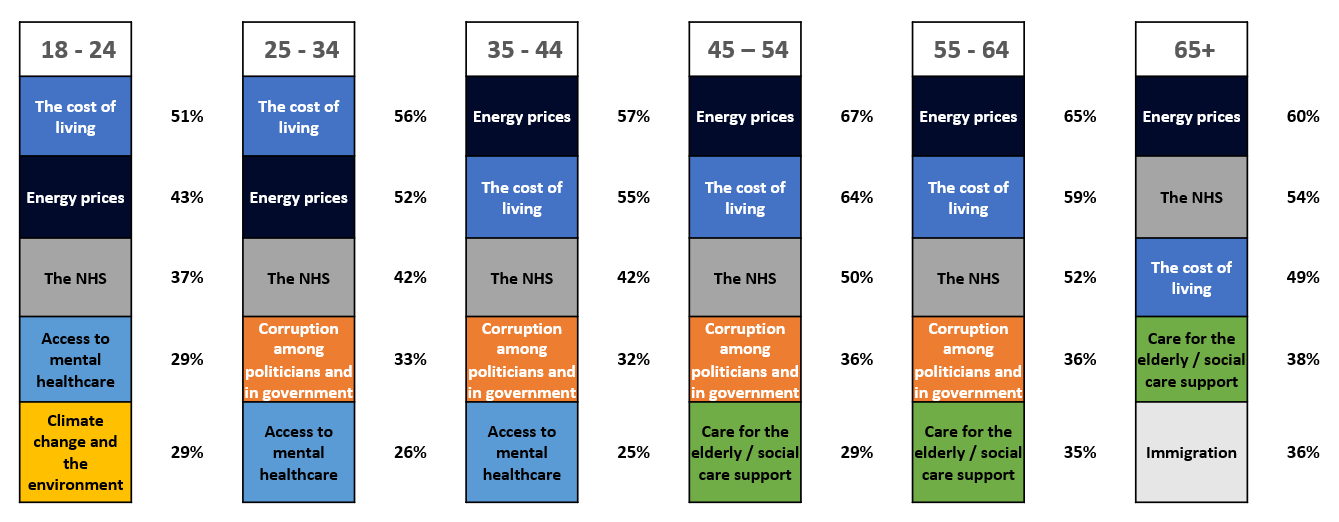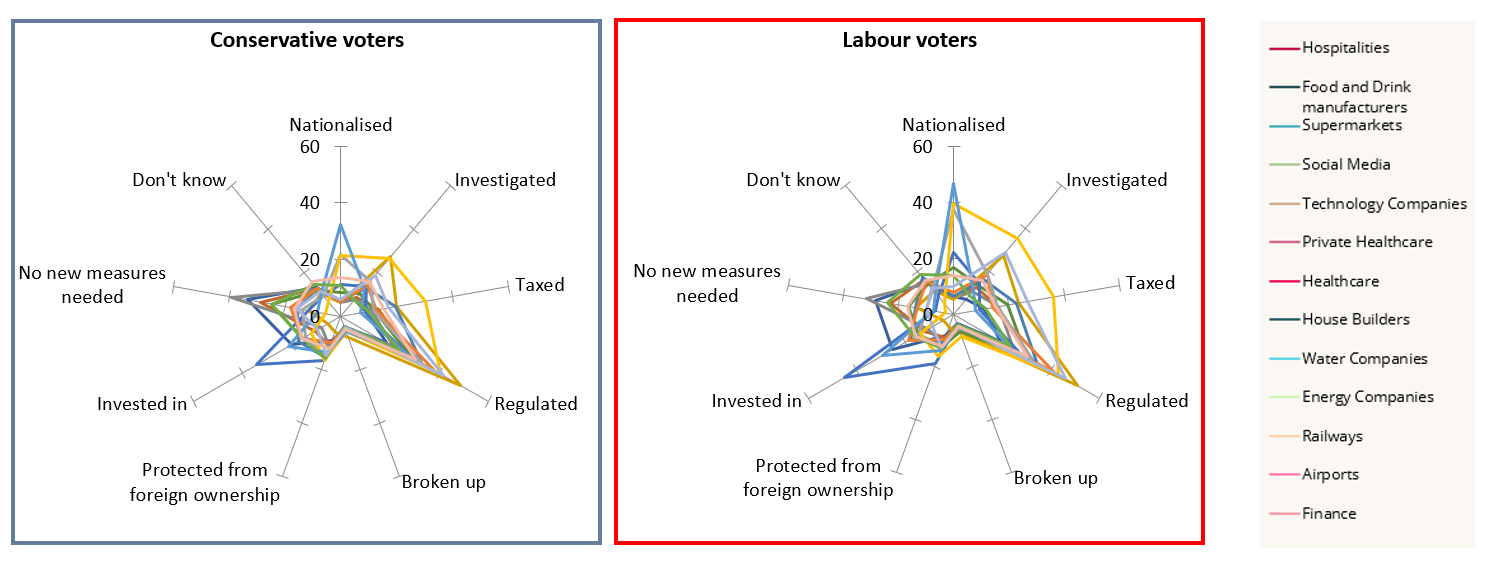An Opportunity to Lead
Each year we cast a wide net to better understand how people view the people and organisations who influence their day to day lives and the results this year are striking: trust in politicians has tumbled, presenting companies with an opportunity to lead.
But while big businesses are trusted more than Governments – national or local – they are not perceived to be stepping up where it really matters. And while people believe businesses should be playing a large role in addressing the nation's most pressing issues, they don't see much action. That 'expectation gap' exists in several areas – including the role business is playing to address the cost of living and to help tackle the climate crisis.
This matters to the private sector because this research shows strong support for Government intervention. If businesses were believed to be doing more to help solve peoples' concerns, there may be less public appetite for tighter controls on their activities.
Backing for measures from nationalisation and taxation to greater regulation is found across all sectors – apart from supermarkets and hospitality. These views are particularly acute for the energy sector. Support for these measures grows among those who say they will vote Labour at the next election.
But if businesses were to take meaningful action on the issues people care about, then our research shows they could earn reputation and build support for the contribution they make across the UK.
We show some of the specific ideas which, where aligned with a company's commercial strategy, could be used as the foundation for a compelling narrative to build trust and close the 'expectation gap'. We have more detailed analysis to provide specific guidance by sector.
And, as we have reported before, companies don’t need to play into political divides. There are five core values – reliability, fairness, respect, hard work and equality – which the majority of the public believe all businesses should share. Values that don’t change regardless of demographic.
Please get in touch if you would like to understand more about this research and find out about the way we help our clients communicate and act to earn reputation.
Businesses Must Act to Earn Reputation
As we emerge from winter, we are more hopeful
Hope is rising – more people feel hopeful or very hopeful about the coming year than they did in the latter half of 2022.
Fewer people are sitting on the fence – only 23% of people claim that they are neither ‘hopeful or not hopeful’, the lowest this proportion has been in the last three years.
But concerns about the cost of living, energy prices and public health remain at the forefront of the public’s concerns. And insights from our focus groups suggest that people are split on whether the end of these crises is in sight.
Q8: Thinking about your own life, and the things that shape it, how hopeful are you about the coming year?
8043 respondents. Fieldwork: 10 Feb 2023 - 17 Feb 2023
The top concerns are consistent across age groups
The public’s top three concerns – the cost of living, energy prices and the NHS – remain consistent across all age groups, while corruption among politicians and government is a shared top concern for those aged 25 - 64. The NHS and access to social care are a greater priority for those aged 45 and older. And immigration features as a top concern for those over 65 years old while climate change appears as a priority for those aged 18-24.
8043 respondents. Fieldwork: 10 Feb 2023 - 17 Feb 2023
Public trust has eroded across the board, most dramatically in Government
Since May 2022, public trust across business, government, non-profit, academia and media has fallen. Trust in national and local government has fallen the most dramatically, and government is now more likely to not be trusted than trusted. The public has greater trust in business than government and big business is more likely to be trusted than not. Overall people are less inclined to have a strong opinion on the trustworthiness of big business. And small businesses are among the most trusted organisations.
Q18: Thinking about what you know and what you have experienced of the following organisations in the UK (their function in society, services they provide, their behaviour as an employer), we would like to know on the whole, how trustworthy you would say they are.
8043 respondents. Fieldwork: 10 Feb 2023 - 17 Feb 2023
Beyond job creation, the public do not recognise positive impact from business
Although big business continues to be more trusted than government, the public do not recognise business as contributing to tackle the challenges facing the UK today or addressing their top concerns (including the cost of living crisis). There is also no clear perceived leader on these issues, with a significant proportion of respondents feeling that nobody – not government, business or non-profit organisations – is addressing the UK’s most important challenges.
Q20: Thinking about the wide range of challenges facing UK society today, we'd like you to tell us who you think is having the most positive impact, through their words and actions in each of the following areas.
8043 respondents. Fieldwork: 10 Feb 2023 - 17 Feb 2023
Big business is falling short on critical public expectations
Currently, the public expect more from business when it comes to supporting the UK’s greatest challenges. In particular, big business is falling short of public expectations when it comes to delivering job creation, climate change, opportunities for young people and help with the cost of living.
Q20: Thinking about the wide range of challenges facing UK society today, we'd like you to tell us who you think is having the most positive impact, through their words and actions in each of the following areas…..
Q21: And continuing to think about these different challenges, we'd like to know who you think has the ability to make the biggest impact on these issues. Please select the organisation you feel could make the greatest difference in...
8043 respondents. Fieldwork: 10 Feb 2023 - 17 Feb 2023
When it comes to business, the public are leaning towards more regulation
Q17: Thinking about the wide range of companies in the UK, we'd like you to tell us what, if any, new measures you feel the government should be taking towards them. Please select all that apply
8043 respondents. Fieldwork: 10 Feb 2023 - 17 Feb 2023
Views on regulation differ across the political spectrum
Beliefs about the need for new measures on business varies across the political spectrum. Conservative voters are less likely to want healthcare, water companies and railways to be regulated. Labour voters are significantly more likely to call for nationalisation across the board and for greater regulation for house builders and social media companies.
Methodology
Poll: We interviewed 8,043 British adults online between 10 February - 17 February 2023. The data is representative of the British adult population.
Focus Groups: We conducted focus groups in February and April to support our poll and collective qualitative insights into the publics’ priorities.
A note on our regression approach:
The above charts have narrowed down the statements we used in our regression analyses to those which were 'statistically significant' in driving hope.
We have taken the "Relative Importance" score from the regression model, as this gives us each statement's contribution to r-square (which is the number that tells us how well the data fits to our regression model i.e. strength of relationship), in percentage form.
This score is more resilient to relationships between the statements themselves than regression coefficients.
It is also worth noting that each regression was run more than once, with the second (and third and fourth) iteration removing the small pool of respondents who were providing 'bad data' (i.e. an algorithm was used to spot any non-logical responses, that would suggest low integrity in the respondents answers).
This gives us greater confidence in the "Relative Importance" scores for our statements, as it lifted the R-square number and ensured the relationship between the statements and ‘trust' were even stronger.








